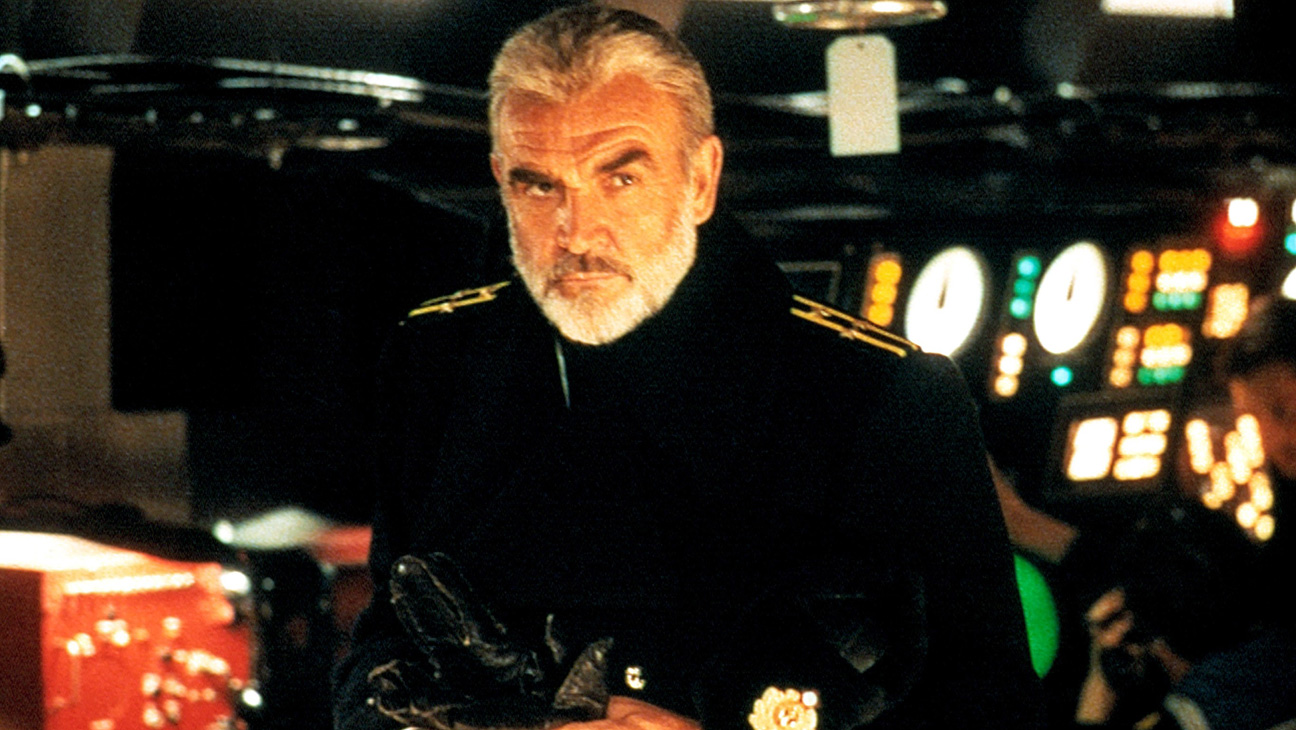“The Hunt For Red October,” which came out 25 years ago this
week, was the culmination of an extraordinary run by director John McTiernan,
beginning with “Predator” and “Die Hard”—one very rarely matched in popular
cinema. The trajectory from beginning to end is interesting as well:
“Predator” seems at first glance to be serving the gods of baroque violence,
being as it is an Arnold Schwarzenegger movie with all the glistening biceps
and visceral spray one infers from his presence. And, while it does
deliver on that count, it is also populated by characters who feel as though
they have lived full lives, animated by strong (and not just in the
muscular sense) performances. Its final movement is almost a critical essay on
the action film, quietly posing the question “if Arnold has to work this
hard to kill the bad guy, is this not one of the definitive villains of the
genre?” The film as a whole has a rich philosophical bent ripe for
interrogation, coming very close to holding the alien hunter in higher moral
regard than Arnold, while simultaneously being a thing equally enjoyable if only watched for violence.
McTiernan then follows with “Die Hard,” another canvas on
which men paint with each other’s blood, but it is one with far greater and
more explicit attention paid to dramatic nuance. Its hero John McClane is vulnerable—to the
point of being barefoot for nearly the entire film—and reliant almost exclusively
on his wits to survive. And when he does use his skills at violence, it’s not
in a controlled, “cool” way. He is heard, although half-buried in the sound
mix, to tell a foe “I’m gonna fuckin’ cook you…and fucking eat you”
while punching him. The villain Hans Gruber, again one of the greatest the
cinema has known, is played by Alan Rickman—sleek, fashionable, erudite, only
undone by his inability to plan for someone as stubbornly incorruptible and
impossible to intimidate as McClane.

“The Hunt For Red October,” adapted by Larry Ferguson from Tom Clancy’s novel, pulls even further back from
overt violence, while losing none of the dramatic tension of its predecessors.
In fact, the entire force of the narrative is drawn from smart people figuring
stuff out.
Both leads are men of letters: CIA analyst Jack Ryan is played by
Alec Baldwin as an amiable, wildly intelligent and erudite nerd, possessed of a very relatable “do the thing while quaking in terror and talking to
yourself” type of bravery. His fear of flying, PTSD-derived rather than phobic,
bookends the movie. The opening flight sees him babbling nervously about
turbulence to a stewardess who suggests he get some sleep. After he prevents
World War III—not a spoiler, the whole point of the movie is in how he
does so—he flies home sound asleep, content in the knowledge that a little
turbulence is nothing compared to talking guys who really want to blow up
Russians into not blowing up Russians, dangling from helicopters in the North
Atlantic and chasing rogue saboteurs around nuclear submarines with guns (the
latter two sequences, however brief, are nonetheless impactful experiences).

The Soviet submarine captain who sets the film’s story in
motion, Marko Ramius, is closer to the traditional model of the man of action.
He is, after all, a naval officer. But it’s significant in multiple ways that
his nickname within the Soviet Navy is “The Vilnius Schoolmaster.” It indicates
the fact that, as a Lithuanian, he is regarded as an Other rather than as a
full-fledged Russian, a detachment that forms part of the basis for Ryan’s
deduction that he may be trying to defect. The phrasing of “schoolmaster” has a
dual edge, one being that Ramius literally taught every submariner in the
Soviet fleet everything they know, and the other being that he keeps a copy of
the “Bhagavad Gita” in his cabin, cites Cortez and Columbus (although the quote
attributed to Columbus was written for the film), and in a humorous revelation
upon their meeting, critiques Ryan’s book on fellow naval maverick
William Halsey: “Your conclusions were all wrong, Ryan. Halsey acted stupidly.”

If Ryan’s conclusions about Halsey were wrong, they’re the
only things he gets wrong in the whole movie. The way in which he
reverse-engineers Ramius’ plot to steal the submarine and defect is as
edge-of-the-seat thrilling as any agglomeration of chase-and-battle scenes
could be, to say nothing of the clarity of thought necessary to punch through
the fearful, knee-jerk assumption all the Joint Chiefs of Staff make that
Ramius plans to nuke the U.S. east coast. Ryan listens, a very important and
oft-overlooked aspect of being a smart person, when an admiral (Fred Dalton
Thompson; “The Hunt For Red October” is packed with terrific character actors)
reminds him “Russians don’t take a dump, son, without a plan,” leading Ryan to
realize that Ramius must have already figured out how he was going to get his
crew, who were not in on the defection plan, off the submarine, at which point
the solution presents itself almost immediately.
Even the moment of desperation
in which Ryan relies on luck to convince the American sub captain (Scott Glenn)
on Red October’s trail not to blow it out of the water, the persuasion he
fabricates is ingeniously built: “Has he made any Crazy Ivans [sudden turns to
sniff out pursuers]?” “What difference does that make?” “Because his next one
will be to starboard.” “Why, because his last was to port?” “No, because he
always goes to starboard in the bottom half of the hour.” That kind of
mathematical precision in creating a piece of luck when he desperately needs it
is thrilling to behold.

This leads neatly to a discussion of another crucial element
of the film’s thrilling intellectual derring-do, the sonar operator Jones,
essayed spectacularly by Courtney B. Vance. Vance plays his first scene as
though curled up by a fire with a glass of brandy and a violin concerto, taking
a disarming amount of pleasure at simply playing the character. He is jolted
from this reverie by the appearance and subsequent disappearance of a new,
unrecorded Soviet submarine. Using his almost eerily cultivated sense of
hearing (honed on classical music), Jones obsessively listens to tape and
eventually detects the audio signature of Red October’s nearly-silent
propulsion system (the means by which it is to reach America and nuke it before
anyone is the wiser), and deduces its course. The scene where Jones explains
all this to his captain is utterly riveting, and delightful to behold, and the
only weapons used are a good pair of headphones, a tape recorder, a nautical
chart, and a magic marker. (It concludes with Vance, having incrementally
increased the tension throughout the scene via line readings,
eliciting what appears to be an involuntary exhalation from Glenn at the
“Eureka!” moment.)
Ramius has already composed his plot and written out the
score before the movie starts, but the nature and theatricality of his
on-screen thinking takes a different form. It’s a marvelous bit of work on
Sean Connery’s part, in which he must be both actor and movie star. He uses his established persona to manifest Ramius’ exalted standing within the military, and very
precise acting through the most minute of gestures to keep up an exhausting
balancing act for the officers and crew of the Red October. He has to
constantly reassure his co-conspirators that he knows what he’s doing, while
dropping hints to the crew that he’s crazier than he is—if announcing his plan to
nuke the eastern seaboard of the U.S. didn’t do the trick—subtly enough that it
doesn’t look deliberate.
The one scene in which he truly lets his guard down is
the one where his first officer, Borodin (Sam Neill), describes his beautifully
utopian plan to live in Montana, and drive around the country in his RV,
wintering in Arizona, capped off with the joke/wistful acknowledgement of the
fantastical nature of this vision, “Perhaps I will need two wives.” Ramius
returns the joke (“Oh, at least!”), but when Borodin asks him what he looks
forward to, Ramius can only exhale a bleak tale of battle fatigue, a
realization long in the coming that a life spent at war is a life knowing only
death, that his plan to defect was not so much a calculated political gesture
as the product of a long life spent in the dark in which, after much
careful and painful consideration, it became clear this was the only way to
ever see the sun.
“The Hunt For Red October”
is a marvel of pop filmmaking, one in which one of Hollywood’s hottest action
directors made an action movie based around thinking, and made it not only the
equal to but a progression from his previous two hits (now classics). The
quarter century since its release has not diminished its delights in the
slightest, and it remains one of the most compulsively re-watchable movies of its, or any other, era. Not bad for a film that consists almost solely of smart people talking.












